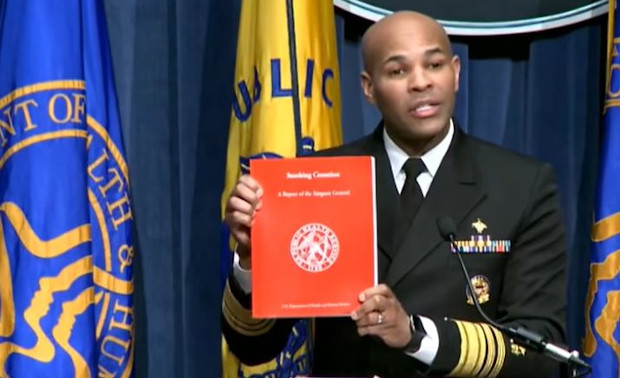
First report on tobacco cessation in 30 years says too many smokers are not routinely advised by their doctors to quit.
U.S. Surgeon General Vice Admiral Jerome M. Adams says Americans "need to get with the times" when it comes to quitting smoking. He says modern quitting tools such as some web-based interventions and text message services are effective and available.

On Jan. 23, Adams issued the first Surgeon General's report on smoking cessation in 30 years. It reviews and updates the latest research on Americans' attempts to quit smoking, what works, and why it's so important.
ACS involvement
ACS has contributed to virtually all of the Surgeon General's smoking reports from 1964 on. This one continues our streak. Two ACS epidemiologists, Eric Jacobs, PhD, senior scientific director, Behavioral and Epidemiology Research Group, and Christina Newton, MSPH, scientist, Behavioral and Epidemiology Research Group, both pictured here, were the primary authors of the section on the cancer-related health benefits of smoking cessation. This section provides an updated comprehensive literature review on how smoking cessation impacts risk of all of the cancers we now know are caused by smoking. It also includes previously unpublished data from our Cancer Prevention Study II (CPS-II) showing how lung cancer risk declines after smoking cessation (relative to continued smoking).
Findings
The report notes that while cigarette smoking among American adults is at an all-time low of 14%, it is still the leading cause of preventable disease, disability, and death in the U.S. About 34 million American adults smoke cigarettes.
The Surgeon General, who lost both of his grandfathers to smoking-related illnesses, notes that nicotine addiction is now recognized as a chronic, relapsing condition, which is why using proven ways to quit smoking are so important. "We know more about the science of quitting than ever before. As a nation, we can and must do more to ensure that evidence-based cessation treatments are reaching the people that need them," said Adams in a statement.
Key findings from the report
- It's never too late or too early to quit smoking. Quitting has benefits for people of any age.
- Quitting can add as much as a decade to life expectancy.
- Smoking is expensive and places a substantial financial burden on not only smokers, but also on health care systems and society. Spending on health care that can be attributed to smoking runs more than $170 billion per year.
- Quitting reduces the risk for many types of cancer, as well as heart disease, lung disease, and reproductive health problems., Quitting can also help people who have been diagnosed with some of these health problems.
- More than 3 out of 5 American adults who have ever smoked cigarettes have quit. Most smokers make at least one attempt to quit each year, but less than ⅓ use FDA-approved medications or behavioral counseling that make success more likely.
- Rates of smoking are higher in some population subgroups, and rates of attempts to quit and getting help to quit are lower. Smoking is increasingly concentrated in populations that may face barriers to quitting. These include people with behavioral health conditions (including mental health conditions or substance use disorders); people of low socioeconomic status; people who are lesbian, gay, bisexual, or transgender; American Indians/Alaska Natives; recent immigrants from countries with a high rate of smoking; residents of the South and Midwest; and people with a disability.
- Insurance coverage for smoking cessation treatment can lead to higher rates of successful quitting and is cost-effective.
- There is not enough evidence to conclude that e-cigarettes, in general, can help people quit smoking. More research needs to be done. E-cigarettes are a continually changing and diverse group of products, used in a variety of ways, so making generalizations is difficult and will take time. The Surgeon General reiterated that it is always unsafe for children, teens, and young adults to use any tobacco products, including e-cigarettes.
- Communities and governments can support smoking cessation by raising the price of cigarettes, adopting comprehensive smoke-free policies, carrying out mass media campaigns, requiring large health warnings with pictures, and maintaining comprehensive statewide tobacco control programs.
The American Cancer Society can help
If you smoke and are ready to quit, or know someone who is, see the American Cancer Society Guide to Quitting Tobacco or call us at 1-800-227-2345.
*Re-posted from MySocietySource.
No comments:
Post a Comment